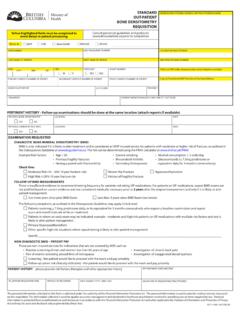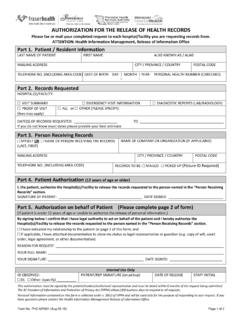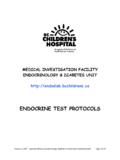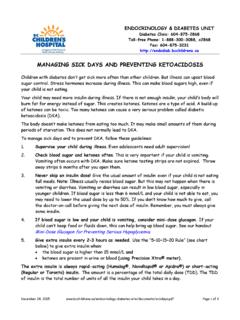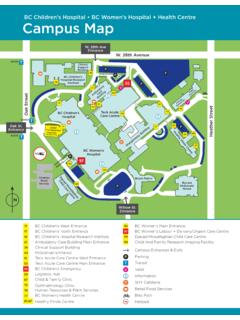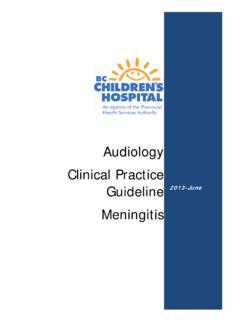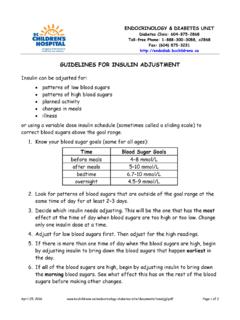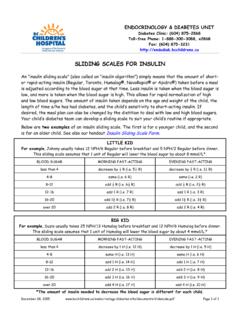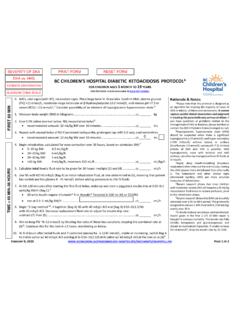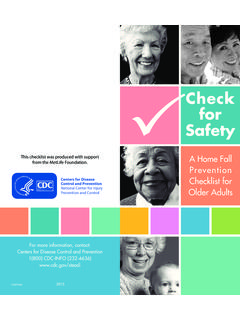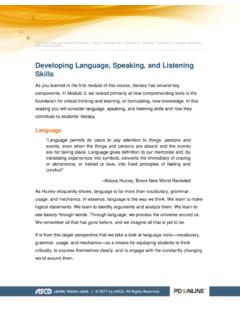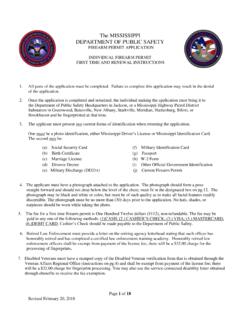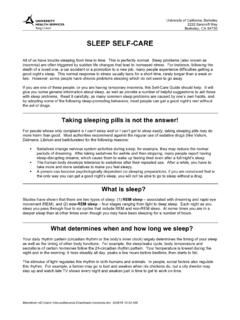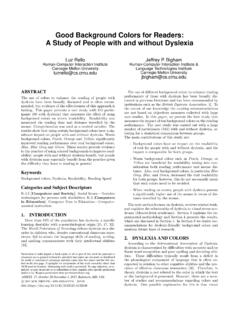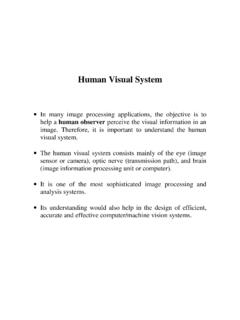Transcription of H.E.A.D.S.S. A Pyschosocial Interview For Adolescents
1 - A Pyschosocial Interview For Adolescents Adapted from Contemporary Pediatrics,, Getting into Adolescent Heads (July 1988), by John M. Goldenring, MD, MPH, & Eric Cohen, MD Background The major cause of morbidity and mortality in Adolescents is unintentional injuries, including motor vehicle accidents, more than half related to drug or alcohol use. Next in importance are other causes of morbidity including unwanted pregnancy, sexually transmitted disease (STD), eating disorders, and mood disorders. All of these situations are not easily amenable to the intervention of a physiologically-oriented health care provider. In fact, they may not even show up on the standard Interview that health care providers are taught to perform.
2 The health care provider who sees Adolescents must be willing to take a developmentally-appropriate psychosocial history. While a fellow at Los Angeles Children s Hospital, Dr. Cohen refined a system for organizing the psychosocial history that was developed in 1972 by Dr. Harvey Berman of Seattle. The system has been used successfully around the world, in the adolescent health care field. This method structures questions so as to facilitate communication and to create a sympathetic, confidential, respectful environment where youth may be able to attain adequate health care. The approach is known as the acronym HEADSS (Home, Education/employment, peer group Activities, Drugs, Sexuallity, and Suicide/depression). Currently, the HEADSS assessment tool is being used in the Youth Health Consultation Service and the Adolescent Care inpatient Unit (ACU) at C&W, and is being taught as part of the regular undergraduate curriculum to UBC medical and dentistry students.
3 Preparing for the Interview The note a health care provider strikes at the outset of the assessment Interview may affect the entire outcome. Parents, family members, or other adults should not be present during the HEADSS assessment unless the adolescent specifically gives permission, or asks for it. Background Preparing for the Interview Starting The Interview Wrapping Up the Interview Interview Questions H ome & Environment E ducation & Employment A ctivities D rugs S exuality S uicide/Depression Confidentiality It is not reasonable to expect an adolescent to discuss sensitive and personal information unless confidentiality can be assured. All Adolescents and families, including caregivers (most commonly a parent or both parents), should be told about confidentiality at the beginning of the Interview .
4 Each health care provider must determine the nature of his/her own confidentiality statement. Belief Systems As a health care provider, your own set of beliefs, based on your knowledge, experience, and level of tolerance in dealing with particular situations, will set the standard in providing developmentally-appropriate health care to youth and their families. Health care providers interfacing with youth may be confronted with difficult situations where this particular belief system may be tested , if not challenged. Particular examples relate to health risk- taking behaviors; 80% of Adolescents in North America are deemed to be physically and psychologically healthy, and the rate of chronic illness is quoted in the literature as up to 10%. When a health care provider is confronted with a particularly challenging situation that causes him/her to be in a dilemma , a youth is seeking options counselling due to unwanted pregnancy, it is suggested that the health care provider consult with a colleague or refer the youth for developmentally-appropriate care.
5 Assumptions Based on particular individual belief systems, these are some assumptions that many of us may have about youth: youth live in a home with two parents all youth go to school and get along with peers and teachers all youth are heterosexual It is of significant importance not to assume , but rather to ask non-judgemental questions in a respectful, caring fashion. Starting The Interview 1. Introduction: Set the stage by introducing yourself to the youth and parents. 2. Understanding of Confidentiality: Ask either the parents or the youth to explain their understanding of confidentiality or confidential health care. 3. Confidentiality Statement: After the youth and family have given you their views (from step 2), acknowledge their responses and add your views accordingly (confidentiality statement), based on the particular situation.
6 Suggestion: If the parents are present before the Interview , always introduce yourself to the adolescent first. In fact, ask the adolescent to introduce you to the other people in the room. This gives the adolescent a clear message that you are interested in him/her. Home Opening Lines: (Less/More) Developmentally-Appropriate Less More Reason Home Tell me about mom and dad. Where do you live, and who lives there with you? Parent(s) may have separated, divorced, died, or left the home. Open-ended question enables one to collect environmental as well as personal history. Examples of Questions Who lives at home with you? Where do you live? How long? Do you have your own room? How many brothers and sisters do you have and what are their ages?
7 Are your brothers and sisters healthy? Are there any new people living in your home? Are your parents healthy? What do your parents do for a living? What are the rules like at home? How do you get along with your parents, your siblings? What kinds of things do you and your family argue about the most? What happens in the house when there is a disagreement? Is there anything you would like to change about your family? Asking about parental abuse or substance use (also see Drugs section) may be difficult. Using a scenario may facilitate this line of questioning, Working with youth I have learned from some kids that their relationship with their parents is a difficult one; by this I mean they argue and fight. Some youth have told me that they wish their parents did not drink so much or use drugs.
8 Is this a situation in your household? Has anything like it happened to you? Education & Employment Opening Lines: (Less/More) Developmentally-Appropriate Less More Reason Education & Employment How are you doing in school? Are you in school? What are you good at in school? What is hard for you? What grades do you get? Poor questions can be answered okay . Open-ended question ask for information about strengths and weaknesses and allow for quantification / objectification. Examples of Questions Which school do you go to? What grade are you in? Any recent changes in schools? What do you like best and least about school? Favourite subjects? Worst subjects? What were your most recent grades? Are these the same or different from the past?
9 Have you ever failed or repeated any years? How many hours of homework do you do daily? How much school did you miss last/this year? Do you skip classes? Have you ever been suspended? What do you want to do when you finish school? Any future plans/goals? Do you work know? How much? Have you worked in the past? How do you get along with teachers, employers? How do you get along with your peers? Inquire about bullying . Activities Opening Lines: (Less/More) Developmentally-Appropriate Less More Reason Activities Do you have any activities outside of school? What do you do for fun? What things do you do with friends? What do you do with your free time? Good questions are open-ended and allow youth to express him/herself. Examples of Questions Are most of your friends from school or somewhere else?
10 Are they the same age as you? Do you hang out with mainly people of your same sex or a mixed crowd? Do you have one best friend or a few friends? Do you have a lot of friends? Do you spend time with your family? What do you do with your family? Do you see your friends at school and on weekends, too? Are there a lot of parties? Do you do any regular sport or exercise? Hobbies or interests? Do you have a religious affiliation, belong to a church, or practice some kind of spiritual belief? How much TV do you watch? What are your favourite shows? Do you read for fun? What do you read? What is your favourite music? Do you have a car use seat belt? Have you ever been involved with the police? Have you ever been charged? Do you belong to a group/gang?
